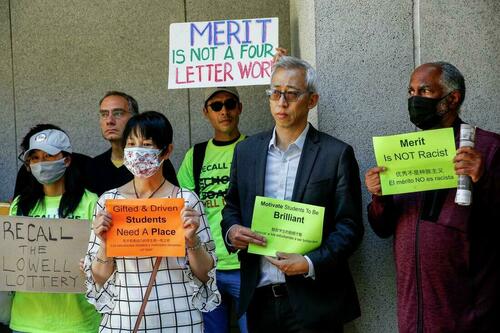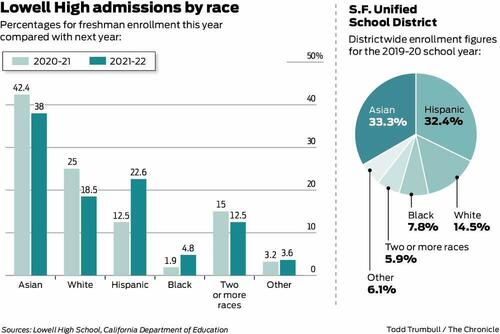
A record number of freshman students at San Francisco's elite Lowell High School earned D and F grades this past fall - the first semester after the school board eliminated merit-based admissions that were deemed "racist" by former SF Board of Education Commissioner, Alison Collins - who was ousted along with two other school board members in a February recall over the admissions debate and other issues - including a series of 2016 tweets by Collins targeting Asian Americans.
Of the 620 freshman students at Lowell, 24.4% received at least one D or F during the fall semester, which compared with just 7.9% of first-year students in fall 2020 and 7.7% in fall 2019, according to internal SF Unified School District figures obtained by the San Francisco Chronicle. Overall, the number of 9th graders at Lowell with a D or F tripled from 51 in 2020 to 152 in 2021 - bringing the figures closer to those at other high schools in the city.
Lowell students in grades 10 through 12 - who were admitted under the old merit-based system, saw a "slight" drop in grades over the same time period, while other city high schools did not see similar rises in D's and F's. In fact, freshman receiving low grades at other schools declined citywide between fall 2019 and 2021.
The lower grades, while expected by many, are likely to become part of a fervid debate over Lowell that touches on race, equity and achievement. The grades raise questions about how students — and the school’s teachers and administrators — are adapting to the changes.
However, it’s unclear exactly how much the change in admissions policy factored into the rise in D’s and F’s among Lowell’s ninth-graders, compared with other possible factors such as the pandemic. -SF Chronicle
In 2020, Collins notably said merit-based achievement and standardized testing are "racist systems" and the "antithesis of fair" - prompting the school to change their admissions policy to a lottery system similar to all other SF city high schools, vs. test scores and grades.
However, many parents I've spoken to disagree with that framing, pointing out that academic achievement shouldn’t be demonized.
— Sophie Bearman (@stbearman) February 2, 2021
Other parents I've heard from say reform is needed but that the process shouldn’t be rushed and that community input is needed. (4/7)
After the school dropped merit-based admissions, Lowell High accepted fewer asian (-4.4%) and white students (-6.5%), and more hispanic (+10%) and black students (+2.9%).
According to outgoing Lowell High principal Joe Ryan Dominguez, there are "way too many variables that contributed" to the rise.
"Over a year of distance learning, half of our student body new to in-person instruction at the high school level and absences among students/staff for COVID all explain this dip in performance," he said - without addressing the fact that students admitted under the merit-based system were doing better than those admitted under the lottery. "It is important not to insinuate a cause on such a sensitive topic at the risk of shaming our students and teachers who have worked very hard in a difficult year."
Pressured by the pandemic, the school board approved a fast-tracked switch from merit- to lottery-based admissions at Lowell starting this school year, citing COVID disruptions to the tests and grades that underpin applications to the school. Lowell’s freshman class this year was the most diverse in decades, with more Black and Latino students.
Both before and since the board’s decision, Lowell’s students, parents, educators and alumni have been locked in a debate over how the school should admit its students in the future.
Lowell has long been one of the top performing public schools in the country, whose alumni include prominent figures in politics, entertainment, literature and science. It’s viewed as a high-pressure launchpad to elite colleges and has offered more advanced placement courses than other San Francisco high schools. -SF Chronicle
Those opposed to the new lottery-based system say it disproportionately hurts Asian American students, who were 'overrepresented' at Lowell vs. other SFUSD schools, and that it ignores the benefits of a competitive school afforded to high-achievers.
During a Tuesday school board meeting, departing district Superintendent Vincent Matthews proposed extending the lottery-based admissions system at Lowell through the 2023-2024 school year while the district launches a public process to determine a long-term solution.
A record number of freshman students at San Francisco’s elite Lowell High School earned D and F grades this past fall – the first semester after the school board eliminated merit-based admissions that were deemed “racist” by former SF Board of Education Commissioner, Alison Collins – who was ousted along with two other school board members in a February recall over the admissions debate and other issues – including a series of 2016 tweets by Collins targeting Asian Americans.
Of the 620 freshman students at Lowell, 24.4% received at least one D or F during the fall semester, which compared with just 7.9% of first-year students in fall 2020 and 7.7% in fall 2019, according to internal SF Unified School District figures obtained by the San Francisco Chronicle. Overall, the number of 9th graders at Lowell with a D or F tripled from 51 in 2020 to 152 in 2021 – bringing the figures closer to those at other high schools in the city.
Lowell students in grades 10 through 12 – who were admitted under the old merit-based system, saw a “slight” drop in grades over the same time period, while other city high schools did not see similar rises in D’s and F’s. In fact, freshman receiving low grades at other schools declined citywide between fall 2019 and 2021.
The lower grades, while expected by many, are likely to become part of a fervid debate over Lowell that touches on race, equity and achievement. The grades raise questions about how students — and the school’s teachers and administrators — are adapting to the changes.
However, it’s unclear exactly how much the change in admissions policy factored into the rise in D’s and F’s among Lowell’s ninth-graders, compared with other possible factors such as the pandemic. –SF Chronicle
In 2020, Collins notably said merit-based achievement and standardized testing are “racist systems” and the “antithesis of fair” – prompting the school to change their admissions policy to a lottery system similar to all other SF city high schools, vs. test scores and grades.
However, many parents I’ve spoken to disagree with that framing, pointing out that academic achievement shouldn’t be demonized.
Other parents I’ve heard from say reform is needed but that the process shouldn’t be rushed and that community input is needed. (4/7)
— Sophie Bearman (@stbearman) February 2, 2021
After the school dropped merit-based admissions, Lowell High accepted fewer asian (-4.4%) and white students (-6.5%), and more hispanic (+10%) and black students (+2.9%).
According to outgoing Lowell High principal Joe Ryan Dominguez, there are “way too many variables that contributed” to the rise.
“Over a year of distance learning, half of our student body new to in-person instruction at the high school level and absences among students/staff for COVID all explain this dip in performance,” he said – without addressing the fact that students admitted under the merit-based system were doing better than those admitted under the lottery. “It is important not to insinuate a cause on such a sensitive topic at the risk of shaming our students and teachers who have worked very hard in a difficult year.”
Pressured by the pandemic, the school board approved a fast-tracked switch from merit- to lottery-based admissions at Lowell starting this school year, citing COVID disruptions to the tests and grades that underpin applications to the school. Lowell’s freshman class this year was the most diverse in decades, with more Black and Latino students.
Both before and since the board’s decision, Lowell’s students, parents, educators and alumni have been locked in a debate over how the school should admit its students in the future.
Lowell has long been one of the top performing public schools in the country, whose alumni include prominent figures in politics, entertainment, literature and science. It’s viewed as a high-pressure launchpad to elite colleges and has offered more advanced placement courses than other San Francisco high schools. -SF Chronicle
Those opposed to the new lottery-based system say it disproportionately hurts Asian American students, who were ‘overrepresented’ at Lowell vs. other SFUSD schools, and that it ignores the benefits of a competitive school afforded to high-achievers.
During a Tuesday school board meeting, departing district Superintendent Vincent Matthews proposed extending the lottery-based admissions system at Lowell through the 2023-2024 school year while the district launches a public process to determine a long-term solution.







